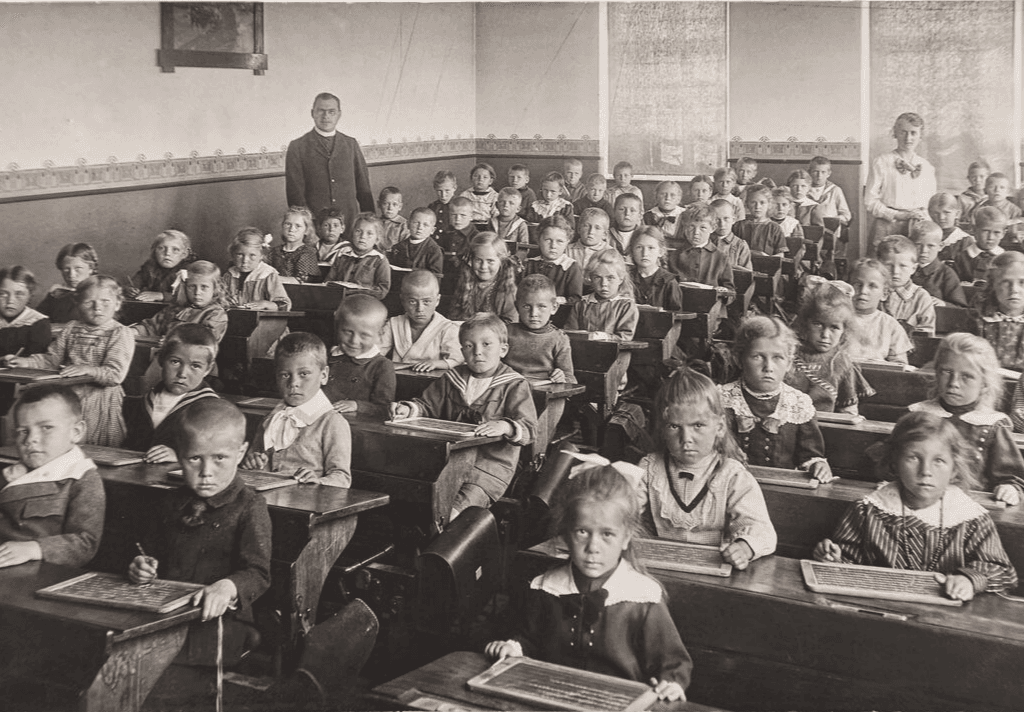When the school system is so outdated that it was designed in the industrial age, the mentality is mass production and mass control; then you know there is something wrong with the system in this new age. Children have to follow the exact instruction of a teacher, and only when they do this they get a reward. These are values of factory workers in the industrial age, not for kids in the technology age, where problem-solving, creative thinking, and teamwork are needed.
That is the reason why children are often bored playing with their smartphones and don´t listen because they have to follow instructions all day. They can´t interact and help each other and become better as a team because they are not allowed to talk.
Learning is only about stubborn memorizing of information that will be frequently tested with an exam, and most knowledge will be forgotten after that. The test scores are the only thing that counts.
There is no room for different passions and interests because everybody gets filled with similar useless information. Students often don´t discover their hidden talents and what they want to do after school.
Many people know that the school systems in most countries are bad, but most aren´t familiar with how it all started and why the education system got even worse over time.
Why are most school systems bad and outdated?
It all started in the late 17. Hundreds early 18. Hundreds, until this date, poor children couldn´t afford education because it wasn´t free. But at the time of the Industrial Revolution, there was a change in how we work, which created the need for universal schooling.
The factory owners required people to have a routine to do the same task over and over efficiently and without error. They should follow the orders which the manager told them and always be on time. Sitting in a school all day with a teacher was good training for that.
In a period of about 20 years in the early 1900s, the now-called “Factory schools” had their beginning. It was the first time; that education was provided by the state with regulations for learning.
All students were separated into different classes according to their age to master the educational program. The approach to teaching was industrialized; it was impersonal, efficient, and standardized. The system at the time worked because it created a strong middle class.
It shows the school system changed in only about 20 years. In the new age of innovation, it is time to adjust it to our required circumstances.
But the only thing that happened was that it was made “better” by doing more of it intensely, and let´s test and measure more carefully, not thinking about how irrelevant it is to live.
If the children don´t benefit from this school system, who does?
Follow the money, and you know it doesn´t go directly to schools and teachers, but to lobbying and private companies and nonprofit organization that make the rules for materials, training resources the policies support that. Of course, private schools also make a business out of failure. It is the only Business market that is developing a product without any valid market research from its end user’s accountability measure and evaluation system.
Buy the next textbook, the next workbook, or the next digital software package. This misinformation company and policies are created by people who spent either little or no time teaching in classrooms.
The “prison of children,” a place of manipulation, control, and profit where everyone waits to get out, doesn’t shape their future.
The standardized exams test a student’s memory and willingness to learn a subject. And on this basis, he is given a worthless piece of paper defining his/her intelligence. This change stopped educating for life and started teaching for tests.
School should be of possibility and hope instead of placement and percentile measurement on standardized tests. The real measures and predictors of student achievement are personal habits and personal values.
When something is aligned with life preparations, people get way more enthusiastic and committed. School shouldn´t be a money-making business; it should be a preparation for creating innovative start-ups and companies.
Stress of students
Ever heard that Stress makes you sick? Well, in this economy, students at an early age get ill because of stress. Bullying, panic attacks, anxiety, and traumatic experiences are common issues in schools.
But the only focus is on what grades they get. The children are not really living they just exist, but what is the point of knowing how to write a perfect essay when you are dead?
The school system’s motto is either you can or can´t make it. Pupils are being trained and not educated; they don´t know how to learn efficiently.
If you’re bad at science or math, people say you’re not trying hard enough, but if you’re bad at things like art, they’ll just say, “Don’t worry, it’s just not your thing.”
When someone doesn´t know the difference between right and wrong, when he doesn´t know the exact history date or hasn´t memorized every mathematical formula, he will be bad in school.
If a student doesn´t understand or fails at something, chances are it is not because of bad teachers or a bad school. But he was missing some other life factors or characteristics social and communication skills, initiative, curiosity, a full belly, or a good night`s sleep.
For some kids, the pressure to get good grades comes from all sides family, friends, the society if he’s not good enough, he is a failure. No wonder this child hates school even more and doesn´t want to learn anymore. That’s why it is important to pay more attention to students and not teachers and schools.
Community, work ethic, character development, and making sure they get enough sleep are what the focus in the schools should be on. Because without testing non-cognitive factors of true success like character and integrity, tests are a complete waste of time.
Everybody should be college-ready; however, not everybody wants or needs to go to college or university. These Students should also be prepared to go for the job they have passion for and shouldn´t be afraid to attempt anything challenging, unable to read or think critically. And what about the people that want to go they often have to take student loans where most of their whole college time and even after being in debt. There is no guarantee of getting a job after they have a degree. When they have to focus on how they pay for the degree, they often have a hard time even getting the degree.
How to learn more effectively?
Schools aren’t built for learning it’s more about copying skills than actually learning them. Students shouldn´t study out of fear they should learn with passion and because they want to. Teachers should teach how to learn and think critically and how to innovate, not how to take tests. They should inspire their pupils and educate them with enthusiasm.
If a student is curious about the topic he learned in school that he wants to do more research at home, then the teacher is on the right track. Because when someone is eager for knowledge, he not only learns faster, he also archives more success.
What you do when you need information is you just search for it on the internet. It’s what most kids do as well when they don´t understand a subject, they look on the internet, where they probably gain more knowledge than in school. That’s why Kids learn more productive outside the school, not inside the school.
– But what if they can research a topic they want to learn about in school?
– What if everybody can learn in different ways depending on abilities, preferences, and interests?
– Why not let them question, explore and experiment with no time-constrained?
– Why not let them actively and socially collaborate and interact with each other?
– Why not give them a feeling of security and valuation so they are able to take risks?
– Why not provide them with a learning experience that is challenging, purposeful, and engaging?
– Why not let them acquire skills and knowledge with meaning that they can use in other places?
– Why not give them Real World problems to solve which have relevance to their lives?
– Why not encourage them to be creative and think outside of the box?
Because then children would find passion and meaning in a project and take control of their own learning. That’s when truly amazing and remarkable things happen.
Topics schools should teach students
In school, you have information overload with a lot of useless facts, but you don´t learn for life after school. So why not teach topics that are really important?
A big part of life is relationships, no matter if love, friendship, or business partner. It is a topic that should be discussed honestly and openly, where everybody can talk about their different feelings and experiences. It is helpful to know how to spot manipulative and abusive behavior. And learn about sexuality in general and give an understanding of the importance of sexual consent.
In this economy, mental health is a topic that should definitely get more attention, especially at the young age of students when stress management skills matter. And where knowledge about depression, addiction, and anxiety is beneficial. They should learn how to openly talk about their mental state, their feelings, and their concerns.
Of course, physical health should also be a subject on how to keep your body fit and eat healthily. Get an awareness of eating disorders and general food knowledge.

The world has so many different cultures, races, social classes, and political situations, which gives a really interesting topic to learn about. It provides an understanding of various situations where students develop empathy and critical thinking abilities and are more open-minded. So they are more willing to help others and bring change for good.
In the era of climate change, it’s essential to learn how to live sustainably. Teachers should educate the youth about eco-friendly living, eat local and seasonal food, and pay attention to the products they buy. Of course, students should gain knowledge about climate change causes and the relevance of renewable energy use.
Other concerns are survival skills like first aid, simple mechanic skills, shelter and fire building, and food and water finding. And self-defense and know-how to handle dangerous situations and how solve conflict situations.
A student should discover skills for concentration and impulse control. With simple meditation and breathing skills and get to know how to live in the moment and how to appreciate life.
After school, people sooner or later have to pay bills with their own money this can be a lot of stress, especially if you don´t know how. Then why not start early and teach them how to keep their personal finance in check? Everybody should pay taxes, but nearly nobody knows how to and what he should consider before tax payday. They should learn the dangers of debit and credit cards. But also they should be taught how to gain money with the investment and where to invest. Students should get an idea of how to save money and obtain interest rates.
Even if in school, you don´t have learned about these topics, it is never too late to educate yourself further. There are enough online courses on all a kind of different topics to learn the important things in life.
Why countries should adopt Finlands school system
The Finnish school system is not about business and making money; it is a student-centered School system because it is 100% state-funded. There is no bad school they all provide an equal level of education and quality. Without any private schools, rich parents have to make sure that the public schools are great, no matter if it is a socially disadvantaged area or a wealthier area. School kids are involved in deciding what will be built for the school playground when architects plan new facilities.
Schools are invested in achieving equal success in the country and don´t compete with each other. When a school finds a new technique that works well, it is quickly shared with other institutions.
The national curriculum is only broad guidelines a learning style can be completely different in other classes but cover the same topics. Teachers and principals make most curricula locally both teachers and students are evaluated by their peers and principals.
In Finland, all teachers have to pass a five-year master’s degree fully paid for by the government and a two-step application system: an exam (about research articles) and interviews. So only the best teacher can educate in schools which makes teaching a highly-respected profession. A teacher only  spends around 600 hours in 180 days teaching, which gives them extra time to develop new innovative teaching strategies to individually assess and respond to the learning needs of their students. The teacher merges passion and education together to help the students to succeed.
spends around 600 hours in 180 days teaching, which gives them extra time to develop new innovative teaching strategies to individually assess and respond to the learning needs of their students. The teacher merges passion and education together to help the students to succeed.
In kindergarten, there is only experimentation through play and movement. Unless children show interest and willingness, they don´t have to learn reading in kindergarten.
Children don´t go to school until they are seven, and they get in elementary school consistent education from the same teacher who they can address by their first name. They almost have no homework, so they have more time to be kids and youngsters to enjoy life.
The elementary school has different starting times and is 20 hours a week with lunch hours that are in total 75 minutes of recess. That is why Finland has the shortest school days and years in the entire western world. All children get the same level of education. When students struggle, the state quickly provides them with resources to help them catch up. About 30% of Finnish kids will get some extra help before high school. That’s why Finnish parents aren´t worried that their children are behind their peers in acquiring a skill.
There are only mandated standardized tests for Finish students who are at the end of their senior years of high school. It gives teachers a lot of flexibility in how they structure their lessons and provides freedom to use more individualized metrics. The school system is really good at ensuring that students complete high school, so around 93% of Finish students graduate.
After high school, there are two pathways vocational schools for the practical hands-on skill needed for work and normal academic programs both can apply to university its a flexible path.
In Finland, it is essential that the children have a good start in life and that teachers and schools work to help weaker students to catch up and to provide a joyful learning experience. So they do better by going to school less.
What can you do?
People are uncomfortable with change; no teacher, no principal, no school, and no government wants to try it first. But change is a part of life. So why not change the school system in the direction of Finland’s system?
In the 1900s, the school system was changed over 20 years, today, in the technology age, a new revolution should be possible a lot faster.
We need all be working together to talk and discuss with each other. Find the right solutions and help to make a better and happier future for the kids. Only with true happiness comes true success, which is not about money it is about fulfillment.
For all the people who earn so much money with standardized testing and toxic policies, I am sorry that you had to waste your time learning without knowing anything about education. Because If you knew you wouldn´t make people transform into robots, no, you would create a school system where students learn to innovate, to be creative, and to think outside the box, so humans only build robots and don´t become one.
For all the teachers, principals and parents, don´t call someone a failure, don´t demotivate and especially don´t stress them, because stress is deadly not only for their health but also for the future of everybody. Instead, help the children to discover their true potential be an inspiration, show engagement and trust, and let them enjoy their childhood to prepare them for life to do the same for others.
And for all the students who are now in school or college, don´t give up on yourself when something doesn´t go as planned, and don´t let other opinions bring you down I know it is hard, but you can make it through. The best thing you can do is to bring up the courage to follow your heart so you find your passion and purpose because then you become the best version of yourself. Show the adult that your grades aren´t important instead, show them that you are more than just a statistic number and show them the remarkable things you can make. So they feel the impact and be inspired to become part of a change for the greater good.
Go out there and be the change you want to see!
If you can change the education system for better, you can change the world.
In my opinion, I think there so many things wrong with our education system. I can list all the problems but all of them lead to money. No good resources because there is no money, teachers are doing a lousy job because they do not get paid good enough and have to do something else on the side, and the list goes on.
You are right school, the only thing that you learn in school is copying skills. It is also a good place to make friends and once you are graduated you can do business together (networking). Hopefully we can take the lesson from Finland and adapt to our school system soon. But change is hard like you said but I still have hopes 🙂
Thank you for your opinion. Yes, the problem is that schools in many countries often don´t get enough money to use it for more qualified teachers and better resources.
Exactly If you only learn one way to get the desired result, it won´t help you later on jobs as you also need problem-solving skills, critical thinking, and other important abilities. So you can find different ways to archive the outcome you want.
I also hope there will be some major changes in countries like the Us or Germany in the direction of the Finish school system.
I take it you’re writing this from the USA. I also take it you’re very young (I’m guessing late teens, max). I don’t know a great deal about your school system but here in the UK it’s not at all as you describe. Yes, the Finnish (the nationality has two ns, the country one) system is often held up as excellent but teaching in this country has moved on a great deal, even in the last twenty years and, while schools struggle to afford new technology, most schools are very much focussed on student welfare. We wouldn’t want people to become airline pilots, accountants, physicians, nurses or a million other things without a good academic grounding and the only way to demonstrate that to a prospective employer is examinations.
Thank you for your comment. I am from Germany and about eight years out of school. Of course, not all school systems are bad; however, many still have industrial parts integrated today.
I am happy to hear that in the UK the school system situation it better. But the fundamentals in Germany and the US, for example, hasn´t changed much in my opinion and from my research.
In some parts of Germany, students have to go to one of three different school forms after the first four years in school. This can restrict job opportunities for some students later as many that are only in “Hauptschule” (easiest and for pupils with bad grades) have it much harder to get to Universities. Because the learned skilled sometimes isn´t enough to reach the grades they need for Universities to become accountants, physicians, doctors, and so on.
I don´t say there don´t need to be any exams, but lesser where also non-cognitive factors of true success like character and integrity are tested.
Yeah, I agree. The current school systems have serious problems. I personally wouldn’t call them terrible, since it’s not all bad, but there are fundamental shortcomings.
Like you said, schools lack in the purpose department. Students don’t know why they are learning or how to study properly. They aren’t taught any of that in school, even though that should come first. You just learn a bunch of stuff most of which you’re not going to use anyway.
Personally I believe that there should be more of a focus on what people will do after school, so that the students can see why they are learning what they’re learning and can actually find motivation.
Thanks for pointing that out. Yes, not all things are bad, but many fundamental and important ones are not as good as they are in Finland, for example.
That´s right, it is often the case you learn things you don´t need later; however, the important stuff like taxes and other useful skills you won´t learn in schools.
Yeah, when the focus is more on how the students discover their strength, it will help them to find the right direction for what they do after school. And of course, this motivates them to learn and improve their skills to become better.
Thankyou for raising this important issue and for making me believe I’m not the only one who thinks this way.
The word Education came from a Latin word called ‘Educe’ which means to bring out or develop, and ironically that too I’ve learned from the internet, not from school. The schooling is doing just the opposite of it, they don’t bring out much, instead, they are filling your brain with kinds of stuff and existing knowledge
Previously I too have written something about it, sharing my experience. Here’s the link to that-
https://theblogera.com/does-schooling-interfere-with-your-education/
Do consider visiting this and let me know what you think of it. And I believe it’ll be a good addition to your blog as well.
Thankyou so much.
Thank you for your comment. I am glad your share similar thinking about the education system.
It is true you have written an interesting article with great ideas and additions to my article.